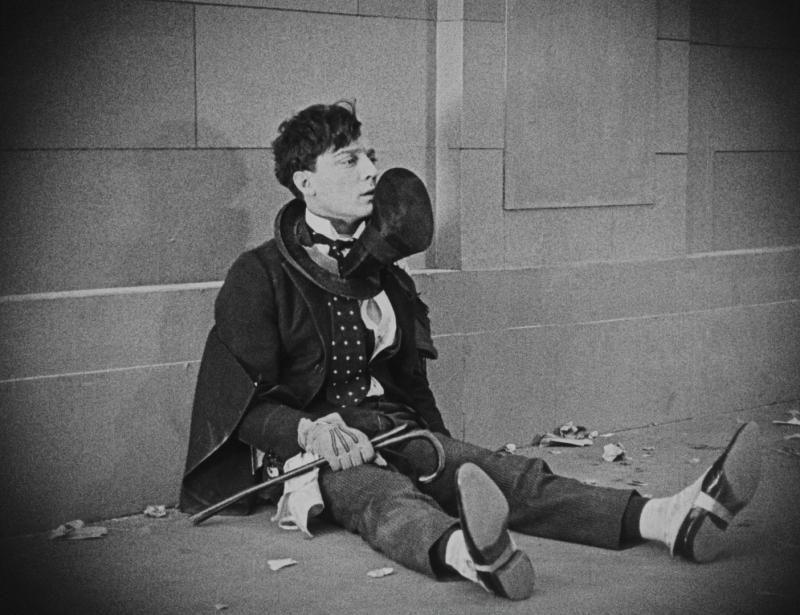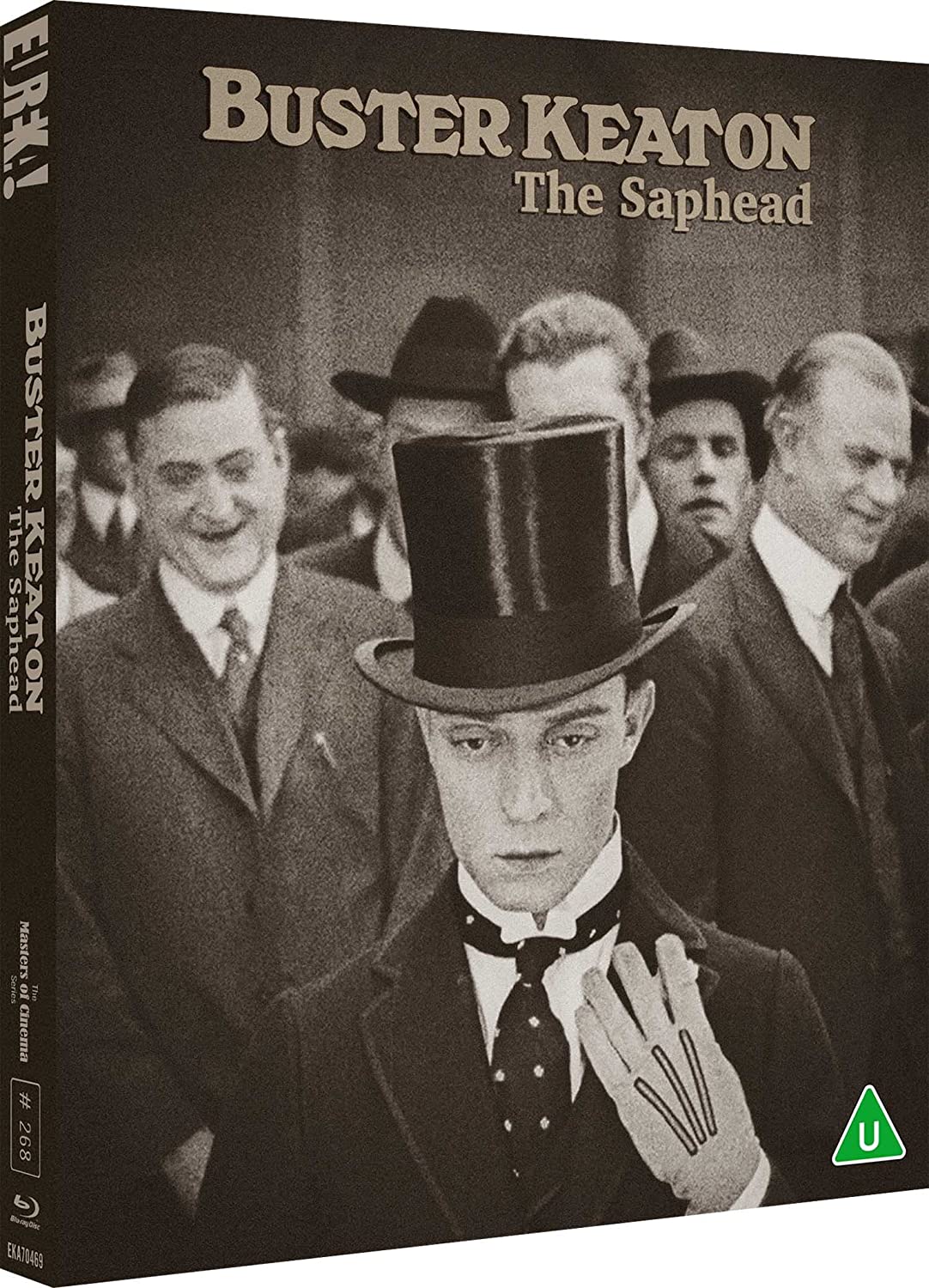Blu-ray: The Saphead | reviews, news & interviews
Blu-ray: The Saphead
Blu-ray: The Saphead
Buster Keaton's intermittently entertaining feature debut, with enticing extras

Buster Keaton made his name in a series of two-reel shorts made from 1917 onwards; The Saphead, from 1920, was his first starring role in a feature film.
It’s in no way comparable to the classics which Keaton produced and directed in his mid-1920s purple patch, the wordy screenplay cobbled together from a pair of popular stage plays and the film directed in workmanlike fashion by Herbert Blaché, who wasn’t familiar with Keaton. Douglas Fairbanks was originally slated to star, recommending his younger colleague for the part of Bertie Van Alstyne when he found himself unavailable.
 That Keaton had very little creative input soon becomes clear; for the most part, The Saphead is a stodgy, over-complicated farce which only becomes diverting when he’s on screen. Keaton’s Bertie is a foppish innocent, an indulged manchild who shows no interest in following his father Nicholas (William H Crane), “the richest man in New York”, to Wall Street. The plot centres on Bertie’s villainous brother-in-law Mark (Irving Cummings) and his efforts to cheat Nicholas out of the family fortune.
That Keaton had very little creative input soon becomes clear; for the most part, The Saphead is a stodgy, over-complicated farce which only becomes diverting when he’s on screen. Keaton’s Bertie is a foppish innocent, an indulged manchild who shows no interest in following his father Nicholas (William H Crane), “the richest man in New York”, to Wall Street. The plot centres on Bertie’s villainous brother-in-law Mark (Irving Cummings) and his efforts to cheat Nicholas out of the family fortune.
Keaton is as otherworldly as ever; we first see him picking at an afternoon breakfast like a pampered pet, waited upon by a pair of fawning servants. Bertie attempts to impress his adopted sister Agnes (Beulah Booker) by behaving like a sophisticated man about town, one sequence seeing him failing to get arrested after a night of illegal gambling. A marriage ceremony doesn’t go to plan, and Bertie eventually pitches up on the floor of the Stock Exchange, mocked and manhandled by other traders before inadvertently saving the family fortune. Despite the multiple locations, The Saphead feels stagey and claustrophobic, fun though it is to see ticker tape machines clattering away behind the cigar smoke in the office scenes.
Keaton’s self-directed films are remarkable for their lack of dialogue cards; they’re simply not needed, whereas reading through the text in The Saphead can be like wading through treacle. Worth seeing, then, but essentially one for completists. Still, it looks immaculate in this Masters of Cinema restoration, taken from a first-generation nitrate print. Andrew Earle Simpson’s occasionally spiky score is effective. Eureka’s generous bonus features make the set worth acquiring. They include a second version of the film comprised of different takes and camera angles, a comparative featurette explaining that studios often produced alternative cuts of film for international markets. Audio-only interviews with the elderly Keaton are fascinating, but the main draw is a chance to see the great man's final screen appearance in The Scribe, a 1966 Canadian short intended to teach construction workers about building site safety. Though he looks frail, Keaton’s comic chops are very much intact, the sight gags involving lifts, dropped bricks and feet getting stuck in buckets still funny.
rating
Share this article
The future of Arts Journalism
You can stop theartsdesk.com closing!
We urgently need financing to survive. Our fundraising drive has thus far raised £49,000 but we need to reach £100,000 or we will be forced to close. Please contribute here: https://gofund.me/c3f6033d
And if you can forward this information to anyone who might assist, we’d be grateful.

Subscribe to theartsdesk.com
Thank you for continuing to read our work on theartsdesk.com. For unlimited access to every article in its entirety, including our archive of more than 15,000 pieces, we're asking for £5 per month or £40 per year. We feel it's a very good deal, and hope you do too.
To take a subscription now simply click here.
And if you're looking for that extra gift for a friend or family member, why not treat them to a theartsdesk.com gift subscription?
more Film
 Sorry, Baby review - the healing power of friendship in the aftermath of sexual assault
Eva Victor writes, directs and stars in their endearing debut feature
Sorry, Baby review - the healing power of friendship in the aftermath of sexual assault
Eva Victor writes, directs and stars in their endearing debut feature
 Blu-ray: Who Wants to Kill Jessie?
Fast-paced and visually inventive Czech comedy
Blu-ray: Who Wants to Kill Jessie?
Fast-paced and visually inventive Czech comedy
 Oslo Stories Trilogy: Love review - freed love
Gay cruising offers straight female lessons in a heady ode to urban connection
Oslo Stories Trilogy: Love review - freed love
Gay cruising offers straight female lessons in a heady ode to urban connection
 Beating Hearts review - kiss kiss, slam slam
Romance and clobberings in a so-so French melodrama
Beating Hearts review - kiss kiss, slam slam
Romance and clobberings in a so-so French melodrama
 Materialists review - a misfiring romcom or an undercooked satire?
Writer-director Celine Song's latest can't decide what kind of film it is
Materialists review - a misfiring romcom or an undercooked satire?
Writer-director Celine Song's latest can't decide what kind of film it is
 theartsdesk Q&A: actor Leonie Benesch on playing an overburdened nurse in the Swiss drama 'Late Shift'
The Guildhall-trained German star talks about the enormous pressures placed on nurses and her admiration for British films and TV
theartsdesk Q&A: actor Leonie Benesch on playing an overburdened nurse in the Swiss drama 'Late Shift'
The Guildhall-trained German star talks about the enormous pressures placed on nurses and her admiration for British films and TV
 Freakier Friday review - body-swapping gone ballistic
Lindsay Lohan and Jamie Lee Curtis's comedy sequel jumbles up more than their daughter-mother duo
Freakier Friday review - body-swapping gone ballistic
Lindsay Lohan and Jamie Lee Curtis's comedy sequel jumbles up more than their daughter-mother duo
 Eight Postcards from Utopia review - ads from the era when 1990s Romania embraced capitalism
Radu Jude's documentary is a mad montage of cheesy TV commercials
Eight Postcards from Utopia review - ads from the era when 1990s Romania embraced capitalism
Radu Jude's documentary is a mad montage of cheesy TV commercials
 The Kingdom review - coming of age as the body count rises
A teen belatedly bonds with her mysterious dad in an unflinching Corsican mob drama
The Kingdom review - coming of age as the body count rises
A teen belatedly bonds with her mysterious dad in an unflinching Corsican mob drama
 Weapons review - suffer the children
'Barbarian' follow-up hiply riffs on ancient fears
Weapons review - suffer the children
'Barbarian' follow-up hiply riffs on ancient fears
 theartsdesk Q&A: filmmaker Dag Johan Haugerud on sex, love, and confusion in the modern world
The writer-director discusses first-love agony and ecstasy in 'Dreams', the opening UK installment of his 'Oslo Stories' trilogy
theartsdesk Q&A: filmmaker Dag Johan Haugerud on sex, love, and confusion in the modern world
The writer-director discusses first-love agony and ecstasy in 'Dreams', the opening UK installment of his 'Oslo Stories' trilogy

Add comment